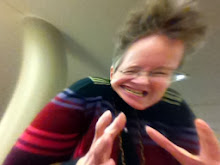Last weekend I attended the Booklist and Book Links Editors Revue at National-Louis University's Center for Teaching through Children's Books, where I met Daniel Kraus and got an ARC of his second YA novel, Rotters.
This book is about as dark as possible for a contemporary realistic setting. It starts out with a familiar YA premise: when Joey's mother is killed in an accident, he must leave his friends in Chicago to live with the father he's never known. The angst of being the new student in a small-town Iowa high school is bad enough, but Joey soon finds that his father is despised by the entire town. To make it even worse, life in his father's rustic cabin and drunken company cause Joey to arrive at school late, muddy, smelly, exhausted, and sometimes without homework or textbooks. Joey and his father must learn to live with and understand each other's motivations.
From this beginning, things get strange: his father's secret vocation, grave-robbing, soon takes over Joey's life completely, and he eventually leaves school and meets a nationwide cabal of eccentric (and competitive) old grave-robbers. From them, he learns much about his father, his mother, and their relationship. Joey lovingly describes the contents of caskets, the process of putrefaction, actions of insects and rodents, various abuses of corpses, live burials... nothing is left out of his gore fest. The "happy" ending is a shock after wallowing through the demented lives of these men. I hope an observant copy editor went over this book before final release, but zombie fans and gamers are bound to love it just the way it is.
 The Monstrumologist, by Rick Yancey, on the other hand, is comfortably rooted in a small New England town in the late 1800s, an historical setting and language far from us. In the tradition of Dr. Frankenstein and Sherlock Holmes, Dr. Warthrop is brilliant but misanthropic and self-absorbed. As a monstrumologist, he is an expert in the history and habits of all things "monstrous": his description and history of Anthropophagi were drawn from actual ancient texts. The orphaned Will Henry serves as his assistant and historian, starting with the ghoulish delivery of an actual specimen by the town graverobber in the dark of night.
The Monstrumologist, by Rick Yancey, on the other hand, is comfortably rooted in a small New England town in the late 1800s, an historical setting and language far from us. In the tradition of Dr. Frankenstein and Sherlock Holmes, Dr. Warthrop is brilliant but misanthropic and self-absorbed. As a monstrumologist, he is an expert in the history and habits of all things "monstrous": his description and history of Anthropophagi were drawn from actual ancient texts. The orphaned Will Henry serves as his assistant and historian, starting with the ghoulish delivery of an actual specimen by the town graverobber in the dark of night.Dr. Warthrop and Will are at first preoccupied with finding where the hideous man-eating humanoids in their cemetery came from, and how they got to New England. The doctor's obsession with proving that his own father (also a monstrumologist) had nothing to do with it lead him to ignore Will's insistence that they should warn people. Of course, there is a bloody, gory massacre, and they become decidedly unpopular with the constable and townspeople. As they research the monstors' history, and attempt to exterminate them, Will realizes that his relationship with the doctor mirrors the doctor's disfunctional relatonship with his own father. The language and vocabulary of this book will appeal to older lovers of steampunk, monsters, and gory cannibalism.




My students love Mostrumologist, but the second book is even more evil because of the human element. I'll have to look for Rotters.
ReplyDeleteAnd I'll have to read the second Monstrumologist - after a few "happy" books!
ReplyDelete